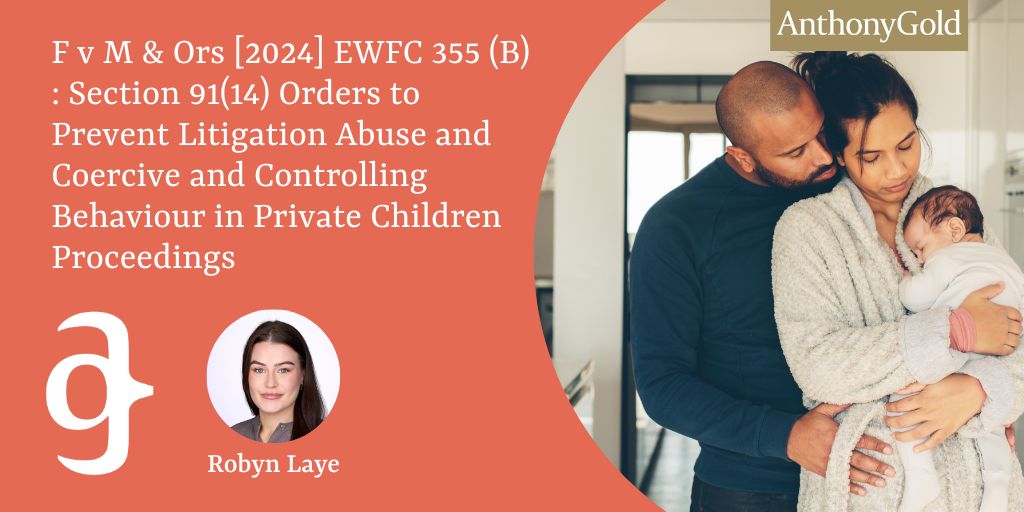F v M & Ors [2024] EWFC 355 (B) : Section 91(14) Orders to Prevent Litigation Abuse and Coercive and Controlling Behaviour in Private Children Proceedings

The long-standing private law proceedings in F v M & Ors [2024] EWFC 355 (B) finally came to an end on the 2 December 2024 when the children’s welfare in the case was put above that of the enduring parental conflict with a Section 91(14) Order.
In summary, this case concerned the welfare and child arrangements of three children, all of whom were represented by a guardian, in a parent’s lengthy ongoing dispute about whether the current child arrangement order should be modified. The key considerations behind this were the psychological impact of the ongoing parental conflict on the children and the ability of each parent to meet the children’s educational and emotional needs. The court found that the emotional and psychological harm to the children outweighed the risks associated with changing residence arrangements. Therefore, by way of a final hearing the court ordered that all children spend seven days with each parent, transitioning on Fridays, and that this would remain in effect for at least three years until the children were in secondary school, thus supporting prioritising their welfare. As such, a barring order was made so that neither parent could make another application for three years.
It should be noted that there was a fact-finding hearing in November 2023 prior to the final hearing, as Her Honour Judge Owens adopted her judgement in the fact-finding hearing in the final hearing also. The findings that Her Honour Judge Owens made in the fact-finding hearing were:
- M had not emotionally or physically abused the children, nor had she neglected their physical and emotional needs.
- Neither party had been coercively controlling towards the other.
- F had made repeated false allegations against M, including one of poisoning.
- F had not done as much as a good parent should to get the children to school regularly and to see their mother.
- F had not clearly and consistently given the children explicit and implicit permission (the latter includes emotional permission) to have a full relationship with their mother.
- F had exposed the children to his and the nanny’s negative views about M.
- Neither party had sought to deliberately influence the children negatively against the other.
- Neither parent had fully protected the children from their incredibly acrimonious conflict, and each had exposed the children to a risk of harm as a result.
- F had breached the child arrangements order without reasonable excuse.
Whilst the judge in F v M & Ors was asked to consider a s91(14) barring order, but she states that she would have considered it of her own motion nonetheless, due to the length of the proceedings and the harm being caused to the children by the ongoing parental conflict.
I would recommend reading the judgement in full as it offers an important insight into issues that should be considered concerning the welfare of a child and child arrangements in the midst of parental conflict.
What is a section 91(14) order?
A Section 91(14) order is a court order that prevents a person from making further applications to the court without the court’s permission. These orders are made under the Children Act 1989 and are used to prevent unnecessary or disruptive applications.
Section 91(14) orders are often used to protect victims of domestic abuse from abusive ex-partners who might try to repeatedly bring them back to court. The orders are intended to be a protective filter, ensuring that the merit of any application is considered before the court gets involved again.
These are commonly referred to as a ‘barring order,’ which is misleading, as whilst they require the courts permission before an application can be made, they are not an absolute bar on future applications. They act as a protective filter only. For example, the parents in F v M & Ors [2024] were excluded from making an application for three years without the court’s permission to allow the emotional and educational welfare of the children to take precedent and allow them a fixed routine until they began secondary school. However, the judge in this case gave consideration as to whether, if an application for leave were to be made during the 3 years by either parent, if the respondent parent would be served with the application before the court had made a determination of the merits of the application. The judge said that they should not be served until after a first determination had been made; otherwise, this would undermine the protective function of the filter.
When can section 91(14) orders be made?
A court can only make a section 91(14) order when the court is dealing with an application under the Children Act 1989. They are made at the conclusion of the public or private proceedings.
For the court to make a section 91(14) order, the court must be satisfied that a further application under the Children Act 1989 would place the child or another relevant individual at risk of harm. The court can make a section 91(14) order on the application of a party or of its own motion. When considering when an order should be made, Her Honour Judge Owens stated in F v M & Ors [2024] that in reference to the parents, “Their children will only be children once, and they desperately need their parents to stop harming them with their adult conflict. As C told the Guardian, she “wants them to be nice to each other” (D201) and “she knows they are not” (D201). That is a damning indictment of the parents by one of their own children, and again I would urge them to reflect on this and to stop what was properly described as their ‘war’ with each other. Failure to do so risks irreparable damage to all of the children, the repercussions of which will last long into adulthood for them and would be likely to adversely affect their adult relationships in the future. From Her Honour Judge Owens conclusions, it is evident that the three-year exclusion on future applications was made with the children’s welfare at the forefront of her mind and was necessary in these proceedings where the parents own judgement had become so clouded due to their personal conflict with one another.
There is a significant acknowledgement that parents can use the court process to weaponise their children against their ex-partners. As a result, it is extremely important that both judges and lawyers are alert to this and ensure the court process is not manipulated so that any case concerning a child ensures their welfare is the priority.
How long can a section 91(14) order last?
The court has discretion as to the appropriate length of the order. This means there is no limit.
An order without a time limit usually lasts until the child reaches 16 years of age. However, such orders should be the exception rather than the rule.
Any time limit should be proportionate to the harm it is seeking to avoid. The court should explain its reasons for the duration of any order (paragraph 14.1, practice direction 12Q). In F v M [2024], Judge Owens made the section 91(14) order until all children were in secondary school due to the parents not prioritising their educational needs and to allow the children some stability.
When will the court give permission for an application under the Children Act when there is a section 91(14) order in place?
The court will give permission for an application under the Children Act after a section 91(14) order has been made if there has been a material change in circumstances. If there has not been a material change in circumstances, the court should not give permission.
Practice Direction 12Q offers further useful guidance on section 91(14) orders. You can find more information on Practice Direction 12Q and the s91(14) barring order here https://anthonygold.co.uk/latest/blog/section-91-14-prevent-litigation-abuse-coercive-controlling-behaviour-private-children-proceedings
* Disclaimer: The information on the Anthony Gold website is for general information only and reflects the position at the date of publication. It does not constitute legal advice and should not be treated as such. It is provided without any representations or warranties, express or implied.*
No comments